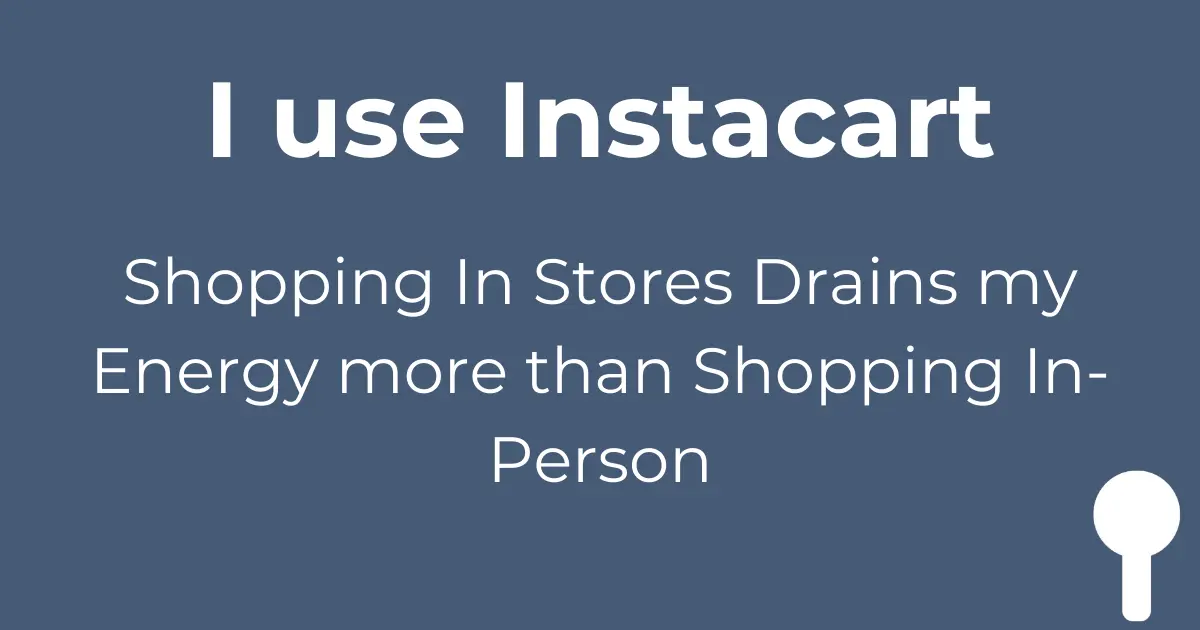
Grocery Stores Destroy Me. Instacart Isn't Convenience—It's Survival.
Lots of loud talking and conversations. Loud intercom speakers. Trying to navigate around people. Workers encouraging small talk.
The sensory overload from all of this happening simultaneously is overwhelming. Fluorescent lights, beeping registers, cart wheels screeching, people brushing past me in narrow aisles—my nervous system is maxed out within minutes.
A grocery store trip costs me around 5 energy.
So I use Instacart 98% of the time instead.
When I shop in person, I need recovery time. When I use Instacart, I can still cook and function the same day.
Why Waiting Until Next Day Is Worth It
Having an exact time to get my groceries helps with predictability.
I wake up at 4:30 AM. I can schedule my groceries to be delivered as early as 8 AM the next day. Free shipping if I choose next-day delivery.
The catch? If I don't order a lot of groceries, my delivery time is often delayed several hours. It doesn’t happen every time, but it happens enough that I plan for it.
Still worth it. Delayed groceries cost fewer energy than going to the store.
The 2% of Times I Go In Person
When I go in person (rare):
- bread
- eggs
- urgent small items
Food Lion in my location opens at 7 AM. I walk in as soon as it opens, pick up my items, and leave immediately.
Theraspecs and noise-canceling headphones the entire time. No exceptions.
If I forget them, I don't go.
Even With Protection, It Still Costs
With Theraspecs and headphones at 8 AM: 2-3 energy.
There are still workers trying to make small talk with me, which means masking—pretending I'm not overwhelmed, forcing a smile, responding politely when I just want to grab my items and leave.
Navigating through aisles is still problematic—just not as chaotic as it would be if I walked in an hour later.
Navigating aisles demands executive function I don't have when I'm already sensorily overwhelmed—deciding which route to take, remembering my list, locating items in unfamiliar sections. It's cognitively exhausting on top of the sensory assault.
"It's Easier to Shop In Person"
My family says this.
That is NOT true.
Even with my accommodations, I can't stand to be inside for more than a few minutes due to sensory overload.
"Easier" ignores the sensory cost entirely.
The Reality
5 energy to shop in person. 2-3 energy even with full protection at the quietest time.
Or: 0 energy unit cost for Instacart, wait until next day.
Doing this 2-3 times per week without Instacart? That would compound into autistic burnout fast. The 5-energy unit drain per trip adds up when I'm already operating on 4-5 energy daily from my warehouse shifts.
The math is clear. Instacart isn't convenience. It's accommodation for a world that clearly wasn't built for me.
I'm Omari, a 23-year-old autistic adult who's been managing chronic burnout for 5+ years while working warehouse shifts.
This is why I built Spoons. To see what actually costs me. To know when avoiding stores is my smart choice, not laziness.
Launching April 2026. getspoons.app - One email when it's ready. No spam.
— Omari
Note: I'm sharing my personal experience as an autistic adult, not medical advice. If you're experiencing severe burnout or crisis, please consult a healthcare provider familiar with autism.
